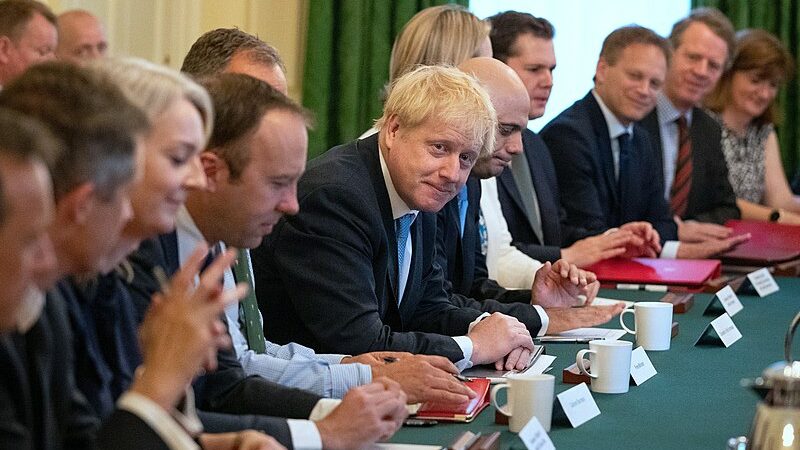
Nearly four years after the referendum, Britain finally left the EU last week. Walking across Parliament Square ahead of the big Brexit bash was a sobering experience. Among the union jacks and fake Big Ben clocktowers, it was difficult not to feel out of place as someone who is not British. Brexit and the Conservative victory rests on a new national story that feels alienating and uncertain to many communities like mine. It is especially worrying for those who fear that the government will bring with them a policy swing towards social conservatism and authoritarianism. Armed with a strong majority in parliament and keen to keep a new electoral coalition together, Boris Johnson has the opportunity to re-define political divides for years to come.
TV clips have since made the rounds on social media of members of the public speaking to journalists at this party about what Brexit means to them. Often, they can’t quite put their finger on it. But what is clear is the desperate hope that now, perhaps, things can and will change. Rather than dismiss this inability to articulate what they think as ‘lack of education’, we should be paying attention to the most important thing that this illuminates: a powerful, emotional pull has brought them to Parliament Square on a rainy and cold January evening, not some fully-fledged political ideal.
This was the successful ingredient of Johnson and the Vote Leave victory all along. It has always stared us in the face but often those in charge of opposite campaigns were unable to understand it. In 2016, Britain Stronger in Europe failed precisely because they gambled that ‘common sense’ would prevail, putting forward a sterile economic argument to counter an emotional offensive from their opponents. It might also be why Labour came closer to victory in 2017 and was utterly trashed in 2019. Our message in December didn’t capture emotions, it didn’t tell a story, whilst in 2017 there was a buzz of hope in the air.
If we look around the country, we know that emotions are running high. People are angry and frustrated at the injustices we see and experience every day. But the left was unable to harness this anger, cultivate it, light a fire in people’s bellies. Everything we offered felt slightly flat instead. The message was that it was ‘common sense’ to vote for a Labour manifesto that would have made us all better off. But, firstly, we didn’t really convince people that it was possible. Secondly, it didn’t cut through that Labour is not just a paternalistic party that wants to do things to people – we also wanted to give back power to communities.
But without Labour being able to set alight these sparks of frustration into a fire of rage against the establishment, channeling this anger into resistance through the labour movement, Johnson and his Vote Leave cronies were able to continuously exploit the present crisis. This crisis should be fertile ground for the left across different countries, but time and time again we see a failure of centre-left, social democratic parties to harness it. Perhaps this points us towards the deeper failure of social democracy: social democracy accepts capitalism and believes that it can be managed to curb its worst excesses. Maybe this is just not working.
Rather than reducing socialism to more funding for public services, we should tell a better story about power. Instead of thinking about the state as a neutral force to capture through parliament, with which we can intervene in our economy, we should have questioned more the constitutional and economic settlement. Whilst Johnson laid down a narrative of oppression that he could free us from, we should have shifted the discussion onto the British state. We should have questioned how our institutions are utilised by the ruling powers for their ends. Rather than blaming an abstract European elite, we should have channeled the anger towards those who are first in line to deserve it: the British ruling class. Instead of an affirmation of the referendum vote, maybe then we could have seen a revolt at the ballot box.
Some Labour activists hope that now, by putting the divisive fight over a Brexit policy behind us, we might be better placed to win over the public on the basis of our economic policies. But this analysis neglects the most dangerous aspect of Johnson’s victory: Brexit has always been a nationalist-authoritarian project rooted in an emotional sentiment about the country. This narrative has allowed challenges and solutions to be framed in a way that helped Johnson to get away with a manifesto offering only simple solutions and slogans. To simply believe that centre-left economic policies will cancel out the emotional appeal of nationalism is naive.
The left has failed to bring back our national conversation to the people’s conquest for power. Now that this narrative is owned by the right, it has turned into something that gives those waving Tommy Robinson flags the confidence to turn up in Parliament Square and be accepted among the crowds. To resist this will be our main task over the next five years. It is time we urgently turned towards it.




More from LabourList
‘It’s one year since I became Britain’s youngest MP. Here’s what I’ve achieved so far’
Tribute: ‘David Lipsey’s joie de vivre is missing in Labour politics today’
Ellie Reeves: ‘One year in, the next phase begins – focused on living standards’